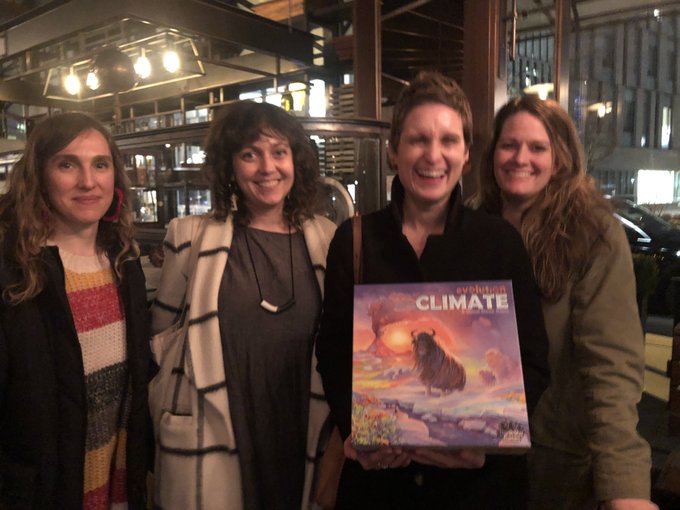Right to Play: Underwater New York at PPEH Lab
March 23, 2020
This guest post was written by the artist members of Underwater New York, Nicki Pombier, Nicole Haroutunian, Helen Georgas, and Nicole Miller, following their micro-residency with PPEH in February 24-26, 2020.

(l-r) Helen Georgas, Nicole Haroutunian, Nicole Miller, and Nicki Pombier enjoy a playful residency in Philadelphia
What does it mean to insist on the right to play in a time of crisis? Bethany Wiggin posed this question on the first of three days that we spent together as resident artists at PPEH. In the midst of rising seas, ecological degradation, or territorial conflict, we wondered how playful invention or transgression might contribute to re-ordering, renovation, or recovery.
These questions are especially relevant for our project, Underwater New York, an object-based, multi-disciplinary platform for creative work inspired by the waters of New York City. We curate a list of lively materials found in our waterways, which serves as a prompt for many of the stories we publish or produce. We also initiate public programming and institutional partnerships that foster creative engagement with our city of waters. As we’ve cultivated this project over ten years, we’ve seen rapid urban development, extreme weather events, and a growing public awareness about the urgency of the climate crisis. This experience has prompted continuous reflection about how our collaborative practice, which centers the city’s edges and their detritus, can catalyze local imagination and resilience. We’ve been delighted to find rigorous, spirited, and generous conversation partners at PPEH.
Our February residency was devoted to exploring how play might inform or transform our relationships with waters. During our time together, Bethany Wiggin and Meg Arenberg invited us to consider a number of questions: How does working with waters generate distinctive procedures for thinking and knowing? What constitutes expertise in a community-based arts project? How does climate change place pressure on the work of artists? How can thinking with objects orient us in time and place? How do we manage and facilitate sustainable collaboration? The residency gave us the opportunity to reflect on our own guiding commitments and to imagine new ventures together, which was both energizing and deeply refreshing. It also showed us how essential it is, in this time of crisis, to have circumscribed time and space to come together in a spirit of shared inquiry. We left our residency newly invigorated and oriented toward the possible. We have tremendous gratitude for our ongoing relationship with PPEH.
